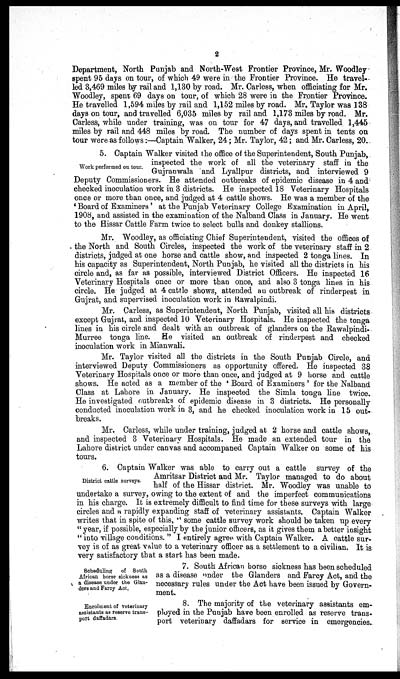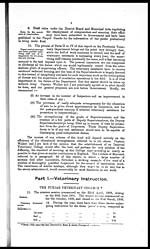Medicine - Veterinary > Civil Veterinary Departments > 1894-1932 - Annual report of the Punjab Veterinary College and of the Civil Veterinary Department, Punjab > 1909-1919 > 1908-1909 - Annual report on the Punjab Veterinary College and of the Civil Veterinary Department, Punjab, for the year 1908-09
(16) Page 2
Download files
Individual page:
Thumbnail gallery: Grid view | List view

2
Department, North Punjab and North-West Frontier Province, Mr. Woodley
spent 95 days on tour, of which 49 were in the Frontier Province. He travel-
led 3,469 miles by rail and 1,130 by road. Mr. Carless, when officiating for Mr.
Woodley, spent 69 days on tour, of which 28 were in the Frontier Province.
He travelled 1,594 miles by rail and 1,152 miles by road. Mr. Taylor was 138
days on tour, and travelled 6,035 miles by rail and 1,173 miles by road. Mr.
Carless, while under training, was on tour for 47 days, and travelled 1,445
miles by rail and 448 miles by road. The number of days spent in tents on
tour were as follows:—Captain Walker, 24; Mr. Taylor, 42; and Mr. Carless, 20.
Work performed on tour.
5. Captain Walker visited the office of the Superintendent, South Punjab,
inspected the work of all the veterinary staff in the
Gujranwala and Lyallpur districts, and interviewed 9
Deputy Commissioners. He attended outbreaks of epidemic disease in 4 and
checked inoculation work in 3 districts. He inspected 18 Veterinary Hospitals
once or more than once, and judged at 4 cattle shows. He was a member of the
'Board of Examiners' at the Punjab Veterinary College Examination in April,
1908, and assisted in the examination of the Nalband Class in January. He went
to the Hissar Cattle Farm twice to select bulls and donkey stallions.
Mr. Woodley, as officiating Chief Superintendent, visited the offices of
the North and South Circles, inspected the work of the veterinary staff in 2
districts, judged at one horse and cattle show, and inspected 2 tonga lines. In
his capacity as Superintendent, North Punjab, he visited all the districts in his
circle and, as far as possible, interviewed District Officers. He inspected 16
Veterinary Hospitals once or more than once, and also 3 tonga lines in his
circle. He judged at 4 cattle shows, attended an outbreak of rinderpest in
Gujrat, and supervised inoculation work in Rawalpindi.
Mr. Carless, as Superintendent, North Punjab, visited all his districts
except Gujrat, and inspected 10 Veterinary Hospitals. He inspected the tonga
lines in his circle and dealt with an outbreak of glanders on the Rawalpindi-
Murree tonga line. He visited an outbreak of rinderpest and checked
inoculation work in Mianwali.
Mr. Taylor visited all the districts in the South Punjab Circle, and
interviewed Deputy Commissioners as opportunity offered. He inspected 38
Veterinary Hospitals once or more than once, and judged at 9 horse and cattle
shows. He acted as a member of the 'Board of Examiners' for the Nalband
Class at Lahore in January. He inspected the Simla tonga line twice.
He investigated outbreaks of epidemic disease in 3 districts. He personally
conducted inoculation work in 3, and he checked inoculation work in 15 out-
breaks.
Mr. Carless, while under training, judged at 2 horse and cattle shows,
and inspected 3 Veterinary Hospitals. He made an extended tour in the
Lahore district under canvas and accompaned Captain Walker on some of his
tours.
District cattle surveys.
6. Captain Walker was able to carry out a cattle survey of the
Amritsar District and Mr. Taylor managed to do about
half of the Hissar district. Mr. Woodley was unable to
undertake a survey, owing to the extent of and the imperfect communications
in his charge. It is extremely difficult to find time for these surveys with large
circles and a rapidly expanding staff of veterinary assistants. Captain Walker
writes that in spite of this, "some cattle survey work should be taken up every
"year, if possible, especially by the junior officers, as it gives them a better insight
"into village conditions." I entirely agree with Captain Walker. A cattle sur-
vey is of as great value to a veterinary officer as a settlement to a civilian. It is
very satisfactory that a start has been made.
Scheduling of South
African horse sickness as
a disease under the Glan-
ders and Farcy Act.
7. South African horse sickness has been scheduled
as a disease under the Glanders and Farcy Act, and the
necessary rules under the Act have been issued by Govern-
ment.
Enrolment of veterinary
assistants as reserve trans-
port daffadars.
8. The majority of the veterinary assistants em-
ployed in the Punjab have been enrolled as reserve trans-
port veterinary daffadars for service in emergencies.
Set display mode to: Large image | Zoom image | Transcription
Images and transcriptions on this page, including medium image downloads, may be used under the Creative Commons Attribution 4.0 International Licence unless otherwise stated. ![]()
| Permanent URL | https://digital.nls.uk/75531138 |
|---|
| Additional NLS resources: |
|---|



![[Page 1]](https://deriv.nls.uk/dcn4/7553/75531137.4.jpg)
